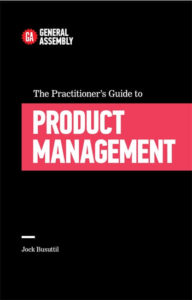
PRODUCTHEAD: Coaching is outsourced willpower
PRODUCTHEAD is a regular newsletter of product management goodness,
curated by Jock Busuttil.
productsnatchers #
every PRODUCTHEAD edition is online for you to refer back to
tl;dr
Common challenges leaders encounter are a lack of trust for their teams and executives, a lack of coaching, and letting go of control
How others perceive the value and effectiveness of the product team’s work holds immense transformative power
hello
For several years I’ve had a succession of personal trainers (PTs) help me with weight training. At the beginning, it was very much about learning the techniques and building up my fundamental fitness level. Even after all this time, I am by no means athletic. Nevertheless, each session gives me a workout, gets me sweaty and a bit out of breath, and occasionally I surprise myself by what I’m able to lift without actually snapping in half.
I’ve noticed a difference between when I have a PT session and when I go to the gym by myself. To begin with I have the confidence that I can run through my training routine. But maybe on the second or third solo visit, I feel that my willpower starts to fizzle out a little bit. I’m just lacking that little push and encouragement from my PT, even if they’re basically just telling me pick heavy things up and put them down again in quick succession.
When I mentioned my predicament to Lovely Wife, she made this incisive observation: having a personal trainer or professional coach is like outsourcing your willpower. Sometimes you are paying them not necessarily to teach you new techniques, but rather to help you achieve the things that you were already capable of doing. They give you that extra little nudge that you otherwise wouldn’t have had by yourself, helping you to dispel any discouraging inner monologue.
Who benefits most from coaching? #
When I think about how I help other people through my product coaching, quite often the people who gain the most from our sessions are not necessarily the ones who need to learn new techniques.
The ones that benefit most are those who simply need to recognise that they are capable of doing all of the things that they want to do. They just need that extra encouragement, or that extra nudge, or even just to have pointed out to them the objective evidence they need to convince themselves that they are capable of doing all of these different things.
So, where does that leave me and coaching? #
I think if you have a surplus of willpower and discipline and self-motivation and belief in yourself then you probably don’t need that much coaching, because you’re effectively acting as your own coach. But — and I’m making a wild assumption here for quite a lot of people — whether we’re tired, stressed out, have taken a bit of a knock professionally, or we’re just in a tough working environment, sometimes we don’t have an abundance of that motivation, discipline and self-confidence. Sometimes we just need to outsource all that to someone else temporarily to help us remember what we’re capable of. That’s what I think is the value of a good coach, whether for professional work or personal fitness.
I’m conscious this may read as a relatively self-serving article that’s saying everyone would benefit from a coach of some variety*. But equally I think it’s about recognising that coaching for some people is about learning new things and for others it is about quelling their inner critic, being reminded of their strengths and regaining the confidence they need to get out there and do their thing.
For you this week #
It’s always valuable to listen in to two great minds in product having an informal and wide-ranging chat. In this episode of the Product Thinking Podcast, CEO and author Melissa Perri interviews leadership coach and author Donna Lichaw. They talk about turning your imposter syndrome to your advantage and how to become the hero of your own story.
You might already know Randy Silver: he co-hosts The Product Experience podcast with Lily Smith, coordinates various communities of practice including CPO Circles and Product in the (A)Ether, and somehow also finds the time to coach product leaders through his firm Out of Owls. He gave a keynote at Mind The Product conference in 2023 providing pragmatic advice on how to handle difficult executives.
Speak to you soon,
Jock
* You would: book some coaching with me :-)
what to think about this week
Becoming the hero of your own story
Melissa Perri welcomes Donna Lichaw to this episode of the Product Thinking Podcast. Donna is a product leader turned leadership coach and the author of The User’s Journey. She joins Melissa to talk about how she helps leaders and executives answer questions like, “how do I get my team excited to show up to work every day?” by becoming the heroes of their own stories.
[Donna Lichaw / Produx Labs]
Getting aligned with your exec team
As product managers, we’re change agents — it’s a hard role to take on because companies aren’t elastic. At the best of times, it can be a stressful craft due to managing change and dealing with difficult teams. Randy offers three ways to get started in delivering value: prioritisation, people and process.
How to handle difficult executives
[Randy Silver / Pendo]
recent posts
Moving up to a CPO or VP Product role
Stepping up to a Chief Product Officer (CPO) or VP Product role doesn’t so much change what you do. Rather it amplifies everything. This guide lets you know what to expect.
Liberating and terrifying in equal measure
[I Manage Products]
I want to update my pricing strategy. Where do I start?
“My product currently has one tier of per-seat pricing for all customers. I want to change my pricing strategy to cater differently for SMEs and enterprise customers. Where do I start?”
A few pricing concepts to consider + further reading
[I Manage Products]
How do I make my product roadmap a better communication tool?
“My product roadmap is not getting the right information across to other people in my company. In particular, my customer success and marketing teams are struggling to plan their work for upcoming product releases. I’m also not sure how I can show my roadmap’s relationship to the half-yearly OKRs we set. How can I improve it?”
Your product roadmap is a communication tool
[I Manage Products]
can we help you?
Product People is a product management services company. We can help you through consultancy, training and coaching. Just contact us if you need our help!
Helping people build better products, more successfully, since 2012.
PRODUCTHEAD is a newsletter for product people of all varieties, and is lovingly crafted from a welcome bout of confidence building.


Leave a Reply